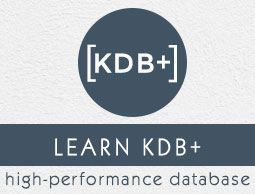
- KDB+ 教程
- KDB+ - 首頁
- Q 程式語言
- Q 程式語言
- Q 語言 - 型別轉換
- Q 語言 - 時間資料
- Q 語言 - 列表
- Q 語言 - 索引
- Q 語言 - 字典
- Q 語言 - 表格
- Q 語言 - 動詞 & 副詞
- Q 語言 - 連線
- Q 語言 - 函式
- Q 語言 - 內建函式
- Q 語言 - 查詢
- Q - 程序間通訊
- Q - 訊息處理器 (.Z 庫)
- KDB+ 有用資源
- KDB+ - 快速指南
- KDB+ - 有用資源
- KDB+ - 討論
Q 程式語言
Kdb+ 自帶其內建的程式語言,稱為q。它包含標準 SQL 的超集,擴充套件用於時間序列分析,並提供比標準版本許多優勢。任何熟悉 SQL 的人都可以在幾天內學習q,並能夠快速編寫自己的臨時查詢。
啟動“q”環境
要開始使用 kdb+,您需要啟動q會話。有三種方法可以啟動q會話:
在執行終端上鍵入“c:/q/w32/q.exe”。
啟動 MS-DOS 命令終端並鍵入q。
將q.exe檔案複製到“C:\Windows\System32”,然後在執行終端上只需鍵入“q”。
這裡我們假設您正在 Windows 平臺上工作。
資料型別
下表提供了受支援的資料型別列表:
| 名稱 | 示例 | 字元 | 型別 | 大小 |
|---|---|---|---|---|
| 布林值 | 1b | b | 1 | 1 |
| 位元組 | 0xff | x | 4 | 1 |
| 短整型 | 23h | h | 5 | 2 |
| 整型 | 23i | i | 6 | 4 |
| 長整型 | 23j | j | 7 | 8 |
| 實數 | 2.3e | e | 8 | 4 |
| 浮點型 | 2.3f | f | 9 | 8 |
| 字元 | “a” | c | 10 | 1 |
| 可變長字元 | `ab | s | 11 | * |
| 月份 | 2003.03m | m | 13 | 4 |
| 日期 | 2015.03.17T18:01:40.134 | z | 15 | 8 |
| 分鐘 | 08:31 | u | 17 | 4 |
| 秒 | 08:31:53 | v | 18 | 4 |
| 時間 | 18:03:18.521 | t | 19 | 4 |
| 列舉 | `u$`b, where u:`a`b | * | 20 | 4 |
原子和列表的構成
原子是單個實體,例如單個數字、字元或符號。在上表(不同資料型別)中,所有受支援的資料型別都是原子。列表是原子或其他型別的序列,包括列表。
將任何型別的原子傳遞給單元(即單引數函式)型別函式將返回負值,即–n,而將這些原子的簡單列表傳遞給型別函式將返回正值n。
示例 1 – 原子和列表的構成
/ Note that the comments begin with a slash “ / ” and cause the parser / to ignore everything up to the end of the line. x: `mohan / `mohan is a symbol, assigned to a variable x type x / let’s check the type of x -11h / -ve sign, because it’s single element. y: (`abc;`bca;`cab) / list of three symbols, y is the variable name. type y 11h / +ve sign, as it contain list of atoms (symbol). y1: (`abc`bca`cab) / another way of writing y, please note NO semicolon y2: (`$”symbols may have interior blanks”) / string to symbol conversion y[0] / return `abc y 0 / same as y[0], also returns `abc y 0 2 / returns `abc`cab, same as does y[0 2] z: (`abc; 10 20 30; (`a`b); 9.9 8.8 7.7) / List of different types, z 2 0 / returns (`a`b; `abc), z[2;0] / return `a. first element of z[2] x: “Hello World!” / list of character, a string x 4 0 / returns “oH” i.e. 4th and 0th(first) element
廣告